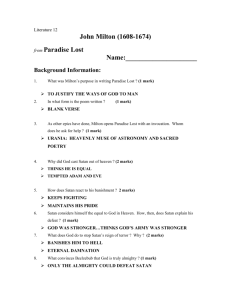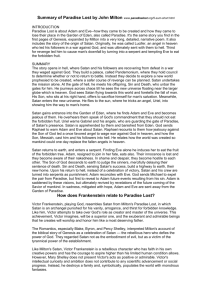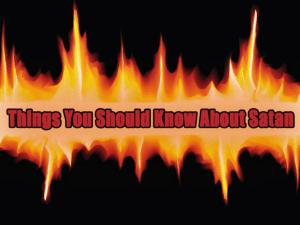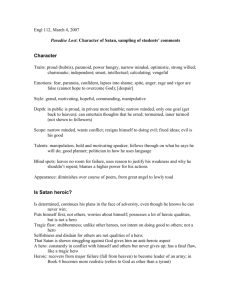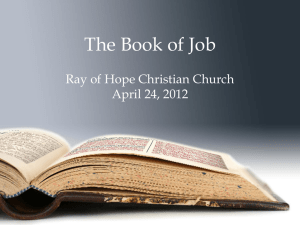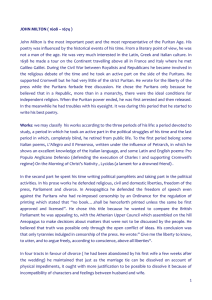Of man's first disobedience, and the fruit
advertisement
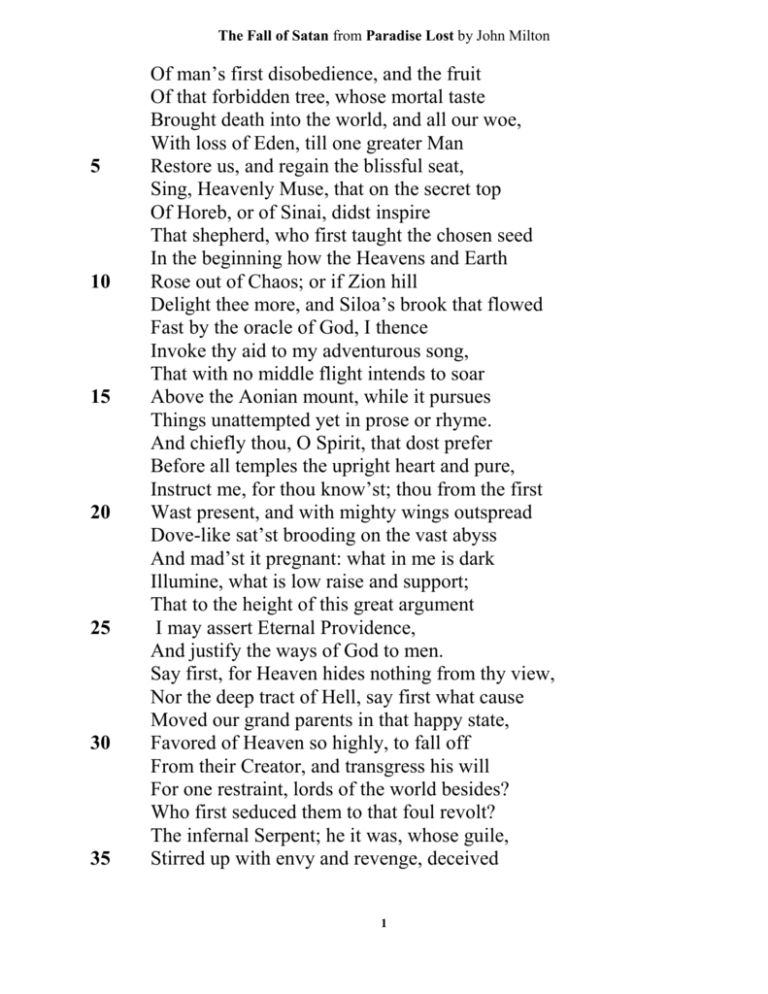
The Fall of Satan from Paradise Lost by John Milton 5 10 15 20 25 30 35 Of man’s first disobedience, and the fruit Of that forbidden tree, whose mortal taste Brought death into the world, and all our woe, With loss of Eden, till one greater Man Restore us, and regain the blissful seat, Sing, Heavenly Muse, that on the secret top Of Horeb, or of Sinai, didst inspire That shepherd, who first taught the chosen seed In the beginning how the Heavens and Earth Rose out of Chaos; or if Zion hill Delight thee more, and Siloa’s brook that flowed Fast by the oracle of God, I thence Invoke thy aid to my adventurous song, That with no middle flight intends to soar Above the Aonian mount, while it pursues Things unattempted yet in prose or rhyme. And chiefly thou, O Spirit, that dost prefer Before all temples the upright heart and pure, Instruct me, for thou know’st; thou from the first Wast present, and with mighty wings outspread Dove-like sat’st brooding on the vast abyss And mad’st it pregnant: what in me is dark Illumine, what is low raise and support; That to the height of this great argument I may assert Eternal Providence, And justify the ways of God to men. Say first, for Heaven hides nothing from thy view, Nor the deep tract of Hell, say first what cause Moved our grand parents in that happy state, Favored of Heaven so highly, to fall off From their Creator, and transgress his will For one restraint, lords of the world besides? Who first seduced them to that foul revolt? The infernal Serpent; he it was, whose guile, Stirred up with envy and revenge, deceived 1 The Fall of Satan from Paradise Lost by John Milton 40 45 50 55 60 65 70 The mother of mankind, what time his pride Had cast him out from Heaven, with all his host Of rebel angels, by whose aid aspiring To set himself in glory above his peers, He trusted to have equaled the Most High, If he opposed; and with ambitious aim Against the throne and monarchy of God, Raised impious war in Heaven and battle proud With vain attempt. Him the Almighty Power Hurled headlong flaming from the ethereal sky With hideous ruin and combustion down To bottomless perdition, there to dwell In adamantine chains and penal fire, Who durst defy the Omnipotent to arms. Nine times the space that measures day and night To mortal men, he with his horrid crew Lay vanquished, rolling in the fiery gulf, Confounded though immortal. But his doom Reserved him to more wrath; for now the thought Both of lost happiness and lasting pain Torments him; round he throws his baleful eyes, That witnessed huge affliction and dismay Mixed with obdurate pride and steadfast hate. At once as far as angels ken he views The dismal situation waste and wild: A dungeon horrible on all sides round As one great furnace flamed, yet from those flames No light, but rather darkness visible Served only to discover sights of woe, Regions of sorrow, doleful shades, where peace And rest can never dwell, hope never comes That comes to all; but torture without end Still urges, and a fiery deluge, fed With ever-burning sulfur unconsumed: Such place Eternal Justice had prepared 2 The Fall of Satan from Paradise Lost by John Milton 75 80 85 90 95 100 105 For those rebellious, here their prison ordained In utter darkness, and their portion set As far removed from God and light of Heaven As from the center thrice to the utmost pole. O how unlike the place from whence they fell! There the companions of his fall, o’erwhelmed With floods and whirlwinds of tempestuous fire, He soon discerns, and weltering by his side One next himself in power, and next in crime, Long after known in Palestine, and named Beelzebub. To whom the Arch-Enemy, And then in Heaven called Satan, with bold words Breaking the horrid silence thus began: “If thou beest he—but O how fallen! how changed From him, who in the happy realms of light Clothed with transcendent brightness didst outshine Myriads though bright—if he whom mutual league, United thoughts and counsels, equal hope And hazard in the glorious enterprise, Joined with me once, now misery hath joined In equal ruin: into what pit thou seest From what height fallen! so much the stronger proved He with his thunder; and till then who knew The force of those dire arms? Yet not for those, Nor what the potent Victor in his rage Can else inflict, do I repent or change, Though changed in outward luster, that fixed mind And high disdain, from sense of injured merit, That with the Mightiest raised me to contend, And to the fierce contention brought along Innumerable force of spirits armed That durst dislike his reign, and, me preferring, His utmost power with adverse power opposed In dubious battle on the plains of Heaven, And shook his throne. What though the field be lost? 3 The Fall of Satan from Paradise Lost by John Milton 110 115 120 125 130 135 140 All is not lost; the unconquerable will, And study of revenge, immortal hate, And courage never to submit or yield: And what is else not to be overcome? That glory never shall his wrath or might Extort from me. To bow and sue for grace With suppliant knee, and deify his power Who from the terror of this arm so late Doubted his empire, that were low indeed, That were an ignominy and shame beneath This downfall; since by fate the strength of gods And this empyreal substance cannot fail, Since through experience of this great event, In arms not worse, in foresight much advanced, We may with more successful hope resolve To wage by force or guile eternal war Irreconcilable to our grand Foe, Who now triumphs, and in the excess of joy Sole reigning holds the tyranny of Heaven.” So spake the apostate Angel, though in pain, Vaunting aloud, but racked with deep despair; And him thus answered soon his bold compeer: “O Prince, O Chief of many thronèd Powers, That led the embattled Seraphim to war Under thy conduct, and in dreadful deeds Fearless, endangered Heaven’s perpetual King, And put to proof his high supremacy, Whether upheld by strength, or chance, or fate; Too well I see and rue the dire event, That with sad overthrow and foul defeat Hath lost us Heaven, and all this mighty host In horrible destruction laid thus low, As far as gods and heavenly essences Can perish: for the mind and spirit remains Invincible, and vigor soon returns, 4 The Fall of Satan from Paradise Lost by John Milton 145 150 155 160 165 170 175 Though all our glory extinct, and happy state Here swallowed up in endless misery. But what if he our Conqueror (whom I now Of force believe almighty, since no less Than such could have o’erpowered such force as ours) Have left us this our spirit and strength entire Strongly to suffer and support our pains, That we may so suffice his vengeful ire, Or do him mightier service as his thralls By right of war, whate’er his business be, Here in the heart of Hell to work in fire, Or do his errands in the gloomy deep? What can it then avail, though yet we feel Strength undiminished, or eternal being To undergo eternal punishment?” Whereto with speedy words the Arch-Fiend replied: “Fallen Cherub, to be weak is miserable, Doing or suffering: But of this be sure, To do aught good never will be our task, But ever to do ill our sole delight, As being the contrary to his high will Whom we resist. If then his providence Out of our evil seek to bring forth good, Our labor must be to pervert that end, And out of good still to find means of evil; Which oft times may succeed, so as perhaps Shall grieve him, if I fail not, and disturb His inmost counsels from their destined aim. But see the angry Victor hath recalled His ministers of vengeance and pursuit Back to the gates of Heaven; the sulfurous hail Shot after us in storm, o’erblown hath laid The fiery surge, that from the precipice Of Heaven received us falling, and the thunder, Winged with red lightning and impetuous rage, 5 The Fall of Satan from Paradise Lost by John Milton 180 185 190 195 200 205 210 Perhaps hath spent his shafts, and ceases now To bellow through the vast and boundless deep. Let us not slip the occasion, whether scorn Or satiate fury yield it from our Foe. Seest thou yon dreary plain, forlorn and wild, The seat of desolation, void of light, Save what the glimmering of these livid flames Casts pale and dreadful? Thither let us tend From off the tossing of these fiery waves, There rest, if any rest can harbor there, And reassembling our afflicted powers, Consult how we may henceforth most offend Our Enemy, our own loss how repair, How overcome this dire calamity, What reinforcement we may gain from hope, If not, what resolution from despair.” Thus Satan talking to his nearest mate With head uplift above the wave, and eyes That sparkling blazed; his other parts besides, Prone on the flood, extended long and large, Lay floating many a rood, in bulk as huge As whom the fables name of monstrous size, Titanian or Earth-born, that warred on Jove, Briareos or Typhon, whom the den By ancient Tarsus held, or that sea-beast Leviathan, which God of all his works Created hugest that swim the ocean stream: Him haply slumbering on the Norway foam, The pilot of some small night-foundered skiff, Deeming some island, oft, as seamen tell, With fixèd anchor in his scaly rind Moors by his side under the lee, while night Invests the sea, and wishèd morn delays: So stretched out huge in length the Arch-Fiend lay Chained on the burning lake; nor ever thence 6 The Fall of Satan from Paradise Lost by John Milton 215 220 225 230 235 240 245 Had risen or heaved his head, but that the will And high permission of all-ruling Heaven Left him at large to his own dark designs, That with reiterated crimes he might Heap on himself damnation, while he sought Evil to others, and enraged might see How all his malice served but to bring forth Infinite goodness, grace, and mercy shown On man by him seduced, but on himself Treble confusion, wrath, and vengeance poured. Forthwith upright he rears from off the pool His mighty stature; on each hand the flames Driven backward slope their pointing spires, and rolled In billows, leave in the midst a horrid vale. Then with expanded wings he steers his flight Aloft, incumbent on the dusky air That felt unusual weight, till on dry land He lights, if it were land that ever burned With solid, as the lake with liquid fire; And such appeared in hue, as when the force Of subterranean wind transports a hill Torn from Pelorus, or the shattered side Of thundering Etna, whose combustible And fueled entrails thence conceiving fire, Sublimed with mineral fury, aid the winds, And leave a singèd bottom all involved With stench and smoke: such resting found the sole Of unblest feet. Him followed his next mate, Both glorying to have scaped the Stygian flood As gods, and by their own recovered strength, Not by the sufferance of supernal power. “Is this the region, this, the soil, the clime,” Said then the lost Archangel, “this the seat That we must change for Heaven, this mournful gloom For that celestial light? Be it so, since he 7 The Fall of Satan from Paradise Lost by John Milton 250 255 260 265 270 Who now is sovereign can dispose and bid What shall be right: farthest from him is best, Whom reason hath equaled, force hath made supreme Above his equals. Farewell, happy fields, Where joy forever dwells! Hail, horrors! hail, Infernal world! and thou, profoundest Hell, Receive thy new possessor; one who brings A mind not to be changed by place or time. The mind is its own place, and in itself Can make a Heaven of Hell, a Hell of Heaven. What matter where, if I be still the same, And what I should be, all but less than he Whom thunder hath made greater? Here at least We shall be free; the Almighty hath not built Here for his envy, will not drive us hence: Here we may reign secure, and in my choice To reign is worth ambition, though in Hell: Better to reign in Hell than serve in Heaven. But wherefore let we then our faithful friends, The associates and copartners of our loss, Lie thus astonished on the oblivious pool, And call them not to share with us their part In this unhappy mansion, or once more With rallied arms to try what may be yet Regained in Heaven, or what more lost in Hell?” 8 The Fall of Satan from Paradise Lost by John Milton Paradise Lost Paradise Lost is an epic poem in blank verse by the 17th-century English poet John Milton. It was originally published in 1667 in ten books; a second edition followed in 1674, redivided into twelve books (mimicking the division of Virgil's Aeneid) with minor revisions throughout and a note on the versification. The poem concerns the Judeo-Christian story of the Fall of Man: the temptation of Adam and Eve by Lucifer and their expulsion from the Garden of Eden. Milton's purpose, stated in Book I, is "to justify the ways of God to men" (l. 26) and elucidate the conflict between His eternal foresight and free will. The main protagonist of this Protestant epic is the fallen angel, Satan. Looked at from a modern perspective it may appear to some that Milton presents Satan sympathetically, as an ambitious and proud being who defies his tyrannical creator, omnipotent God, and wages war on Heaven, only to be defeated and cast down. Indeed, William Blake, a great admirer of Milton, and illustrator of the epic poem, said of Milton that 'he was a true Poet, and of the Devil's party without knowing it'. Some critics regard the character of Lucifer as a precursor of the Byronic hero. Milton worked for Oliver Cromwell and thus wrote first-hand for the English Commonwealth. Arguably, the failed rebellion and reinstallation of the monarchy left him to explore his losses within Paradise Lost. Some critics say that he sympathized with the Satan in this work, in that both had experienced a failed cause. The story is innovative in that it attempts to reconcile the Christian and Pagan traditions: like Shakespeare, Milton found Christian theology lacking, requiring something more. He tries to incorporate Paganism, classical Greek references and Christianity within the story. He idolized the classics but intended this work to surpass them. The poem grapples with many tough theological issues, including fate, predestination, and the Trinity. As an Arian, Milton did not believe in the Trinity, but only in the Father and the Son. He presents a Father who is good but irascible and sarcastic, and a Son who is generous and optimistic. The Son serves as a "vessel" for the Father's more goodnatured aspect. 9 The Fall of Satan from Paradise Lost by John Milton Story: The story is divided into twelve books against Homer's twenty-four books of the Iliad and Odyssey. The longest book is Book IX, with 1189 lines and the shortest, Book VII, with 640. Each book is preceded by a summary titled "The Argument". The poem follows the epic tradition of starting in medias res (Latin for in the midst of things), the background story being told in Books V-VI. Milton's story contains two arcs: one of Satan and another of Adam and Eve. Lucifer's story is an homage to the old epics of warfare. It begins in medias res, after Lucifer and the other rebel angels have been defeated and cast down by God into Hell. In Pandemonium, Lucifer must employ his rhetorical ability to organize his followers; he is aided by his lieutenants Mammon and Beelzebub. At the end of the debate, Satan volunteers himself to poison the newly-created Earth. He releases Sin and Death into the world, and braves the dangers of the Abyss in a manner reminiscent of Odysseus or Aeneas. The other story is a fundamentally different, new kind of epic: a domestic one. Adam and Eve are presented for the first time in Christian literature as having a functional relationship while still without sin. They have arguments, passions and personalities, as well as sex. Satan successfully tempts Eve by preying on her vanity and tricking her with semantics, and Adam, seeing Eve has sinned, knowingly commits the same sin by also eating of the fruit. In this manner Milton portrays Adam as a heroic figure but also as a deeper sinner than Eve. They again have sex, but with a newfound lust that was previously not present. After realizing their error in consuming the "fruit" from the Tree of Knowledge, they fight. However, Eve's pleas to Adam reconcile them somewhat. Adam goes on a vision journey with an angel where he witnesses the errors of man and the great Flood, and he is saddened by the sin that they have released through the consumption of the fruit. However, he is also shown hope - the possibility of redemption - through a vision of Jesus Christ. They are then cast out of Eden and an angel adds that one may find "A paradise within thee, happier farr." They now have a more distant relationship with God, who is omnipresent but invisible (unlike the previous tangible Father in the garden of Eden). 10 The Fall of Satan from Paradise Lost by John Milton Main characters Satan - Satan has been seen as the story's object of admiration, and there is a point to emulating or celebrating him like a true hero. He struggles to overcome his own doubts and weaknesses, and accomplishes his goal of corrupting mankind. Satan is regarded as the most intriguing and compelling of the characters, mainly for his complexity and subtlety. In these regards, he is similar to the character of Iago in Shakespeare's Othello. Another current believes that Satan's role as the hero mimics Achilles's injured merit, Odysseus's wiles and craft, and Aeneas's journey to find a new homeland. Others claim that Milton personifies in Satan the spirit of the English Revolution; that Milton's Satan represents the honor and independence of the nation asserted in the face of an incapable government. First known as Lucifer, he was a proud angel who failed to think of himself as equal to the other angels. The day God pronounces the Son as his successor in power, Lucifer rebels out of envy, taking with him a third of all the population of angels in Heaven. He is extremely proud and confident that he can overthrow God; his speeches are always fraudulent and deceitful. He assumes many forms during the story, which are reflective of his moral and rational degradation. First, he is a fallen angel of enormous stature; then a humble cherub; a cormorant; a toad; and finally, a snake. He is a picture of incessant intellectual activity without the ability to think morally. Adam and Eve - Adam is strong, intelligent and rational, made for contemplation and valor, and before the fall, as perfect as a human being could be. He is flawed however, and at times indulges in rash and irrational attitudes. His pure reason and intellect are lost as a result of the fall, Man never being able again to converse with angels as near-equal (as he did with Raphael) but forever one-sided (as he did with Michael after the fall). His weakness is his love for Eve. He confides to Raphael that his attraction to her is almost overwhelming – something that Adam's reason is unable to overcome. After Eve eats from the Tree of Knowledge, he decides to do the same, realizing that if she is doomed, he must follow her into doom as to not lose her - even if that means disobeying God. 11 The Fall of Satan from Paradise Lost by John Milton Eve is the mother of all mankind, inferior in rational faculties to Adam, considered to be closer to God, made for softness and "sweet attractive Grace". She only surpasses him in beauty, beauty as such she even falls in love with her own image upon seeing her reflection in a body of water (a reference to the Greek myth of Narcissus). It is her vanity that Satan taps into in order to persuade her to eat from the Tree of Knowledge, through flattery. Eve is clearly intelligent but unlike Adam she is not eager to learn, being absent from Adam and the angel Raphael's conversation in Book VIII, and Adam's visions presented by Michael in Books XI and XII. Eve does not feel it is her place to seek knowledge independently, as she prefers to have Adam teach her later. The one instance in which she deviates from this passiveness is when she goes out on her own and ends up seizing the fruit of the Tree of Knowledge. God - Milton's God is omniscient, omnipresent and omnipotent, which means that He has foreknowledge of further events, but does not predestinate – which would negate the whole idea of free will. The problem with interpreting the character of God in Paradise Lost is that he is more of a personification of abstract ideas than a real character. It is wrong to think of Him as a kindly old man or as a human father as He is ultimately unidentifiable. He is the embodiment of pure reason. He allows evils to occur, but to make good out of evil. The literary critic William Empson crystallized many reader's qualms about Milton's God in his influential book of the same name. The Son - The Son is the manifestation of God in action, the physical connection between God the Father and his creation, together forming a complete and perfect God. He personifies love and compassion and volunteers to die for humankind in order to redeem them, showing his dedication and selflessness. Through his human form the Son will be descended from Adam, through whom all men died, but He will be a second Adam, by whom all men shall be saved. In Judgment Day, the Son will appear in the sky and have dead summoned from every corner of the world, sentence the sinners into Hell. Adam's final vision in Book XII is of the Son's sacrifice as Jesus. 12 The Fall of Satan from Paradise Lost by John Milton Summary of The Fall of Satan Milton's epic poem opens on the fiery lake of hell, where Satan and his army of fallen angels find themselves chained. Satan and his lieutenant Beelzebub get up from the lake and yell to the others to rise and join them. Music plays and banners fly as the army of rebel angels comes to attention, tormented and defeated but faithful to their general. They create a great and terrible temple, perched on a volcano top, and Satan calls a council there to decide on their course of action. The fallen angels give various suggestions. Finally, Beelzebub suggests that they take the battle to a new battlefield, a place called earth where, it is rumored, God has created a new being called man. Man is not as powerful as the angels, but he is God's chosen favorite among his creations. Beelzebub suggests that they seek revenge against God by seducing man to their corrupted side. Satan volunteers to explore this new place himself and find out more about man so that he may corrupt him. His fallen army unanimously agrees by banging on their swords. Satan takes off to the gates of hell, guarded by his daughter, Sin, and their horrible son, Death. Sin agrees to open the gates for her creator (and rapist), knowing that she will follow him and reign with him in whatever kingdom he conquers. Satan then travels through chaos, and finally arrives at earth, connected to heaven by a golden chain. God witnesses all of this and points out Satan's journey to his Son. God tells his Son that, indeed, Satan will corrupt God's favorite creation, man. His Son offers to die a mortal death to bring man back into the grace and light of God. God agrees and tells how his Son will be born to a virgin. God then makes his Son the king of man, son of both man and God. Meanwhile, Satan disguises himself as a handsome cherub in order to get by the angel Uriel who is guarding earth. Uriel is impressed that an angel would come all the way from heaven to witness God's creation, and points the Garden of Eden out to Satan. Satan makes his way into the Garden and is in awe at the beauty of Eden and of the handsome couple of Adam and Eve. For a moment, he deeply regrets his fall from grace. This feeling soon turns, however, to hatred. 13 The Fall of Satan from Paradise Lost by John Milton Uriel, however, has realized that he has been fooled by Satan and tells the angel Gabriel as much. Gabriel finds Satan in the Garden and sends him away. God, seeing how things are going, sends Raphael to warn Adam and Eve about Satan. Raphael goes down to the Garden and is invited for dinner by Adam and Eve. While there, he narrates how Satan came to fall and the subsequent battle that was held in heaven. Satan first sin was pride, when he took issue with the fact that he had to bow down to the Son. Satan was one of the top angels in heaven and did not understand why he should bow. Satan called a council and convinced many of the angels who were beneath him to join in fighting God. A tremendous, cosmic three-day battle ensued between Satan's forces and God's forces. On the first day, Satan's forces were beaten back by the army led by the archangels Michael and Gabriel. On the second day, Satan seemed to gain ground by constructing artillery, literally cannons, and turning them against the good forces. On the third day, however, the Son faced Satan's army alone and they quickly retreat, falling through a hole in heaven's fabric and cascading down to hell. This is the reason, Raphael explains, that God created man: to replace the empty space that the fallen angels have left in heaven. Raphael then tells of how God created man and all the universe in seven days. Adam himself remembers the moment he was created and, as well, how he came to ask God for a companion, Eve. Raphael leaves. The next morning, Eve insists on working separately from Adam. Satan, in the form of serpent, finds her working alone and starts to flatter her. Eve asks where he learned to speak, and Satan shows her the Tree of Knowledge. Although Eve knows that this was the one tree God had forbidden that they eat from, she is told by Satan that this is only because God knows she will become a goddess herself. Eve eats the fruit and then decides to share it with Adam. Adam, clearly, is upset that Eve disobeyed God, but he cannot imagine a life without her so he eats the apple as well. They both, then, satiate their new-born lust in the bushes and wake up ashamed, knowing now the difference from good and evil (and, therefore, being able to choose evil). They spend the afternoon blaming each other for their fall. 14 The Fall of Satan from Paradise Lost by John Milton God sends the Son down to judge the two disobedient creatures. The Son condemns Eve, and all of womankind, to painful childbirths and submission to her husband. He condemns Adam to a life of a painful battle with nature and hard work at getting food from the ground. He condemns the serpent to always crawl on the ground on its belly, always at the heel of Eve's sons. Satan, in the meantime, returns to hell victorious. On the way, he meets Sin and Death, who have built a bridge from hell to earth, to mankind, whom they will now reign over. When Satan arrives in hell, however, he finds his fallen compatriots not cheering as he had wished, but hissing. The reason behind the horrible hissing soon becomes clear: all of the fallen angels are being transformed into ugly monsters and terrible reptiles. Even Satan finds himself turning into a horrible snake. Adam and Eve, after bitterly blaming each other, finally decide to turn to God and ask for forgiveness. God hears them and agrees with his Son that he will not lose mankind completely to Sin, Death and Satan. Instead, he will send his son as a man to earth to sacrifice himself and, in so doing, conquer the evil trinity. Michael is sent by God to escort Adam and Eve out of the Garden. Before he does, however, he tells Adam what will become of mankind until the Son comes down to earth. The history of mankind (actually the history of the Jewish people as narrated in the Hebrew Bible) will be a series of falls from grace and acceptance back by God, from Noah and the Flood to the Babylonian exile of the Jewish people. Adam is thankful that the Son will come down and right what he and Eve have done wrong. He holds Eve's hand as they are escorted out of the Garden. 15
